A. General
The COVID-19 pandemic has emerged as an unprecedented global threat to all humanity. Even the most developed countries have been shaken due to the pandemic, especially in the face of the challenges relevant to health systems and all other areas of life. Pandemic restrictions imposed in almost every country in the world to varying degrees have affected individuals, social life and economic activities. Türkiye believes that the fight against this global catastrophe can only be won through international cooperation and solidarity. In this direction, Türkiye has shared messages with and made concrete contributions to the international community at both multilateral and bilateral level.
At the national level, under the skilful leadership of our President, our institutions and society understood the severity of the situation at an early stage, and thanks to the measures taken, the ingression of the pandemic into our country was delayed by any means necessary. After the onset of the pandemic, Türkiye has successfully maintained its resistance against this serious disaster owing to the opportunities provided by our physical and health infrastructure.
Our Ministry has stood by our citizens abroad, using the opportunities offered by the world's fifth-largest diplomatic network with its 253 Turkish representations abroad. The existence and the strength of our state have been felt in every part of the world. The efforts to meet the needs of our citizens abroad and the repatriation of our people from all over the world to our country have been followed with appreciation and shown as an example in international circles.
B. Institutional structuring of the Ministry of Foreign Affairs of the Republic of Türkiye in the face of the COVID-19 pandemic: Coordination and Support Centre
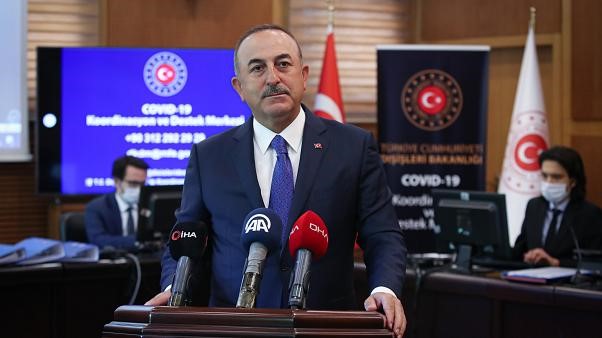
Our Ministry concluded that the COVID-19 pandemic, which has had multidimensional global effects by posing an extraordinary and urgent challenge, cannot be countered in the usual institutional order. Therefore, it established a special structure. In this context, the Coordination and Support Centre of the Ministry of Foreign Affairs was established on March 25th, 2020, to provide a more effective response and guidance related to the issues faced abroad, including monitoring and evaluating all developments regarding the COVID-19 pandemic and most importantly, helping our citizens, through the establishment of the necessary coordination with our national institutions, representations abroad and foreign countries. The Centre, which adapts all institutional procedures, resources and mechanisms of the Ministry and its representations abroad to the conditions arising from COVID-19 and mobilizes them for the fight against the pandemic, operates with a strong team and an enabling infrastructure, and is led by Deputy Minister Yavuz Selim Kıran and reports to Minister Mevlüt Çavuşoğlu.
The Coordination and Support Centre, the priority task of which is to assist our citizens abroad in difficult humanitarian, social and economic conditions imposed by the pandemic, has served as the focal point for coordination in Türkiye and within the Ministry of Foreign Affairs in the process of repatriation of our citizens - primarily and most urgently of those who were in foreign countries temporarily as tourists, workers or visitors and stranded there due to the closure of the borders.
All kinds of problems of our citizens abroad like health issues, funerals and financial problems have been addressed one-on-one by our representations, in coordination with the Centre. Cooperating with non-governmental organizations, our representations have also provided supplies and cash assistance to our citizens in need.
Under the management of the Coordination and Support Centre, our Embassies and Consulates have worked 24 hours a day to identify all citizens abroad who were stranded and suffered hardships, and they helped them personally. Our representations were with our citizens on their journey from their homes or hotels to their flight to Türkiye.
For some of our citizens needing to take a plane in another country, the closed borders between two foreign countries were opened for our official vehicles with diplomatic registration plates to bring them to airports. In some cases, vital medicines were delivered to our citizens in need, and our citizens were taken to the Ambassadors’ residences in diplomatic vehicles and stayed there until their departure time.
As of 20 April 2022, 5,425 citizens abroad unfortunately lost their lives due to COVID-19, 5,134 of them have been brought back home. The Centre closely monitors the transfer of corpses to their places of burial through close contact with their relatives, and during this process, the Centre asks about and tries to meet the wishes and needs of the families. Minister Mevlüt Çavuşoğlu attaches utmost importance to this process and monitors it personally.
Currently, the status of every citizen with COVID-19 disease is monitored, and those treated in the hospital are given the necessary attention by our representations abroad.
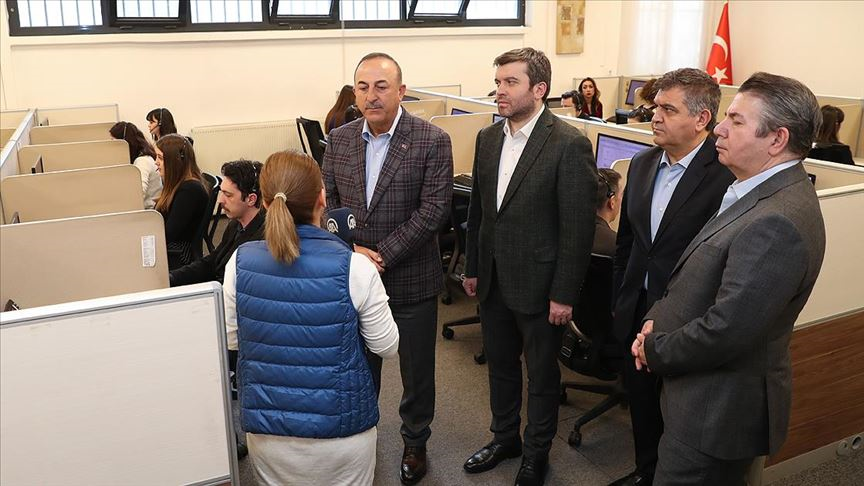
Our Ministry’s Consular Call Centre, which serves on a 24/7 basis, supports our citizens who request information about consular services and have questions to ask, by giving them information and guiding them. Nearly 240 thousand calls have been answered by the Consular Call Centre. No calls were left unanswered. Similarly, social media accounts of the Ministry of Foreign Affairs are used frequently by our citizens for communication. Each and every message is replied to.
The Coordination and Support Centre also manages and channels medical equipment assistance to other countries and international organizations in consultation with the Ministry of Health and other organizations.
Border arrangements, transportation, travel and the conditions and restrictions applied in the neighbouring countries and around the world in this context are monitored by the Coordination and Support Centre, and necessary steps are taken in foreign countries in line with the commercial and economic interests of our country. The Coordination and Support Centre has assumed the primary responsibility for the revitalization of tourist movements to our country by initiating international flights (flights have been reopened with 112 destinations as of 20 April 2022) and cancelling travel restrictions.
For the use of all our relevant institutions, the departments of the Ministry and representations abroad, the Coordination and Support Centre publishes daily reports that compile developments in the world about the pandemic, the situation and the needs of our citizens, and applications and requests of other countries.
The Coordination and Support Centre has also prepared comprehensive reports, including the global effects of the pandemic, normalization processes and compilations of opportunities that may arise during and after the pandemic and has submitted them periodically to the use of our relevant institutions.
In the Coordination and Support Centre, vaccine research studies in the world are also monitored, information transmitted through our Representations abroad is compiled and shared with the Ministry of Health.
Also, information about the testing, quarantine and treatment systems of other countries against the COVID-19 infection and disease is reported to our Ministry of Health.
With its publications, our Centre for Strategic Research has channelled academic discussions during the COVID-19 pandemic. In this context, an interdisciplinary review “The post COVID-19 Global System: Old Problems, New Trends”, based on pre-analyses of respected academics and experts, was published in April when the pandemic was in full swing and uncertainty prevailed. Similarly, the work titled “The World after COVID-19: Cooperation or Competition?” that includes assessments and analyses of reputable scientists, global thinkers and experts about the impacts of COVID-19 on the international system, states, people, great power competition, international organizations, security, globalization, and conflicts was published in June by the Centre for Strategic Research and Antalya Diplomacy Forum.
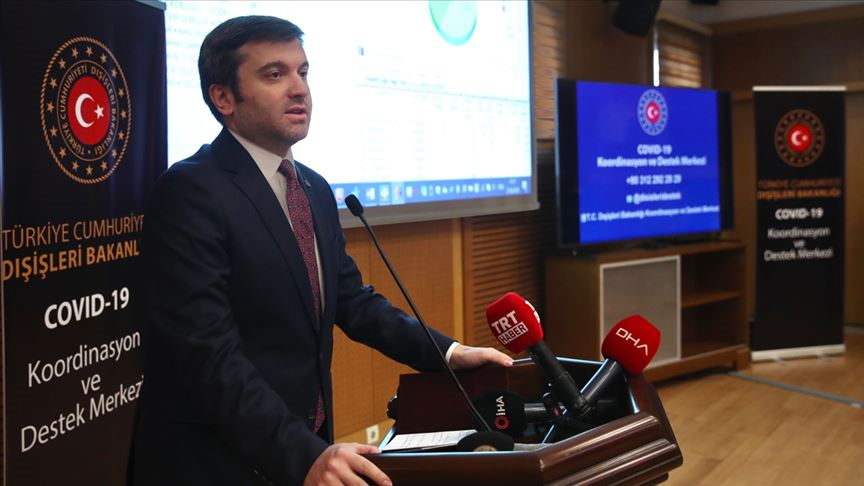
C. Repatriation of Our Citizens Abroad to our country
The welfare, security, and above else the safe return of all Turkish citizens living and residing outside their motherland are our main priority. With this understanding, under the instructions of the President, the Ministry was mobilized to bring our citizens stranded abroad to our country.
A complex and months-long repatriation operation around the world was successfully carried out with the cooperation of our Ministry, the Ministry of Transport and Infrastructure, the Ministry of Interior, the Ministry of Youth and Sports and the Ministry of Health, along with Lending and Boarding Institution, Disaster and Emergency Management Presidency (AFAD), Turkish Red Crescent and Turkish Airlines.
Since the beginning of the crisis, more than 100 thousand Turkish citizens have been repatriated from 142 countries.
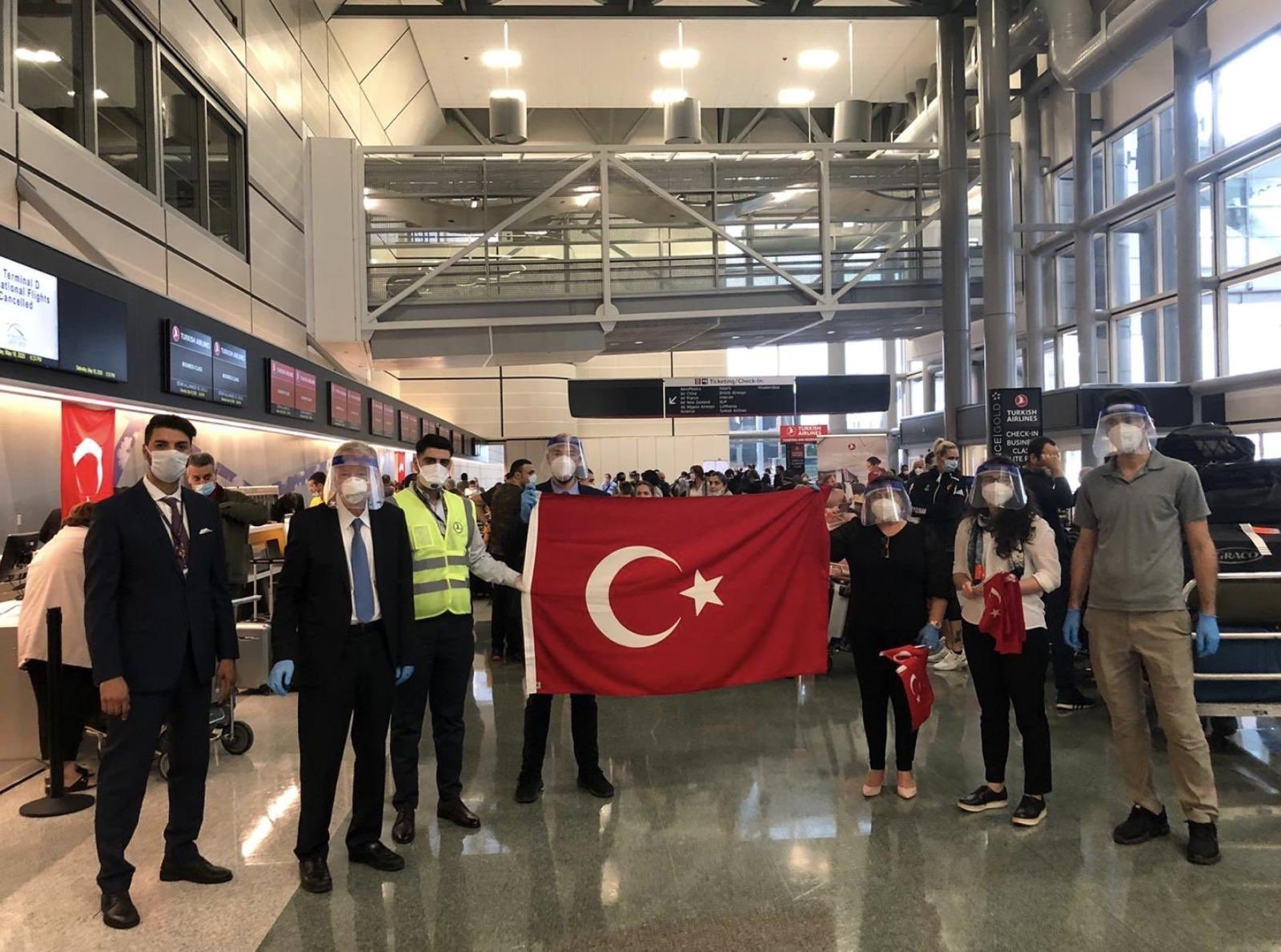
This has been recorded as the largest-scale repatriation operation in the history of the Republic of Türkiye.
Among the countries where we have ensured the repatriation of our citizens are also small islands in hard-to-reach areas in very remote continents. Considering that there are also interprovincial travel bans in many countries, the complexity of the operation can be better understood. From Brazil to Mauritania and from Canada to Bali, our citizens in four continents have been repatriated.
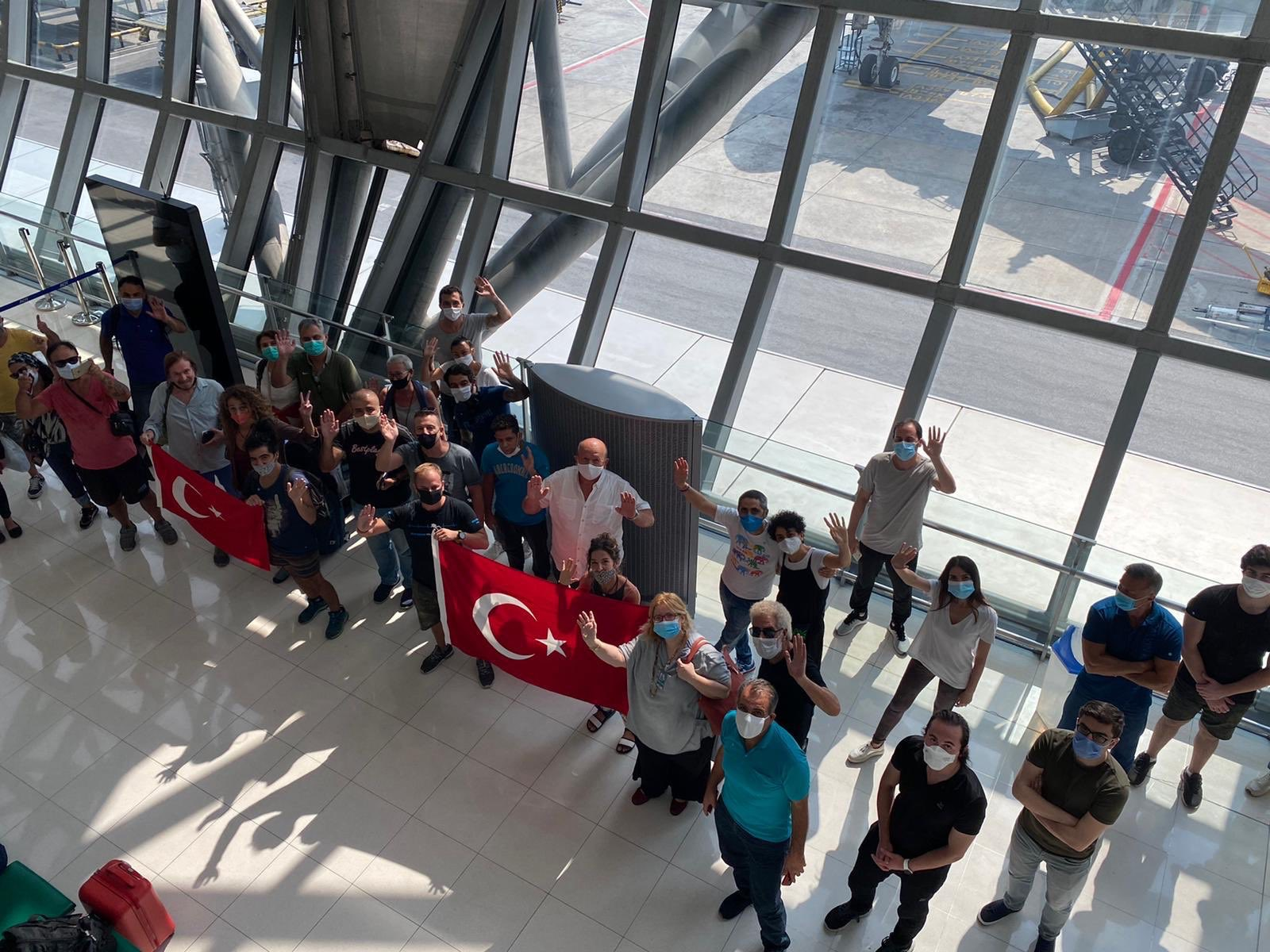
D. Repatriation of third-country citizens
In cooperation with our relevant institutions, the Ministry has facilitated the repatriation operations of 91 countries’ citizens from March 17 to June 11, and 37,682 foreign nationals were repatriated from our country. 290 thousand foreign nationals left our country with our direct or indirect help from March 17 until June 11, 2020 - when pandemic-related restrictions were lifted.
E. Medical Aid
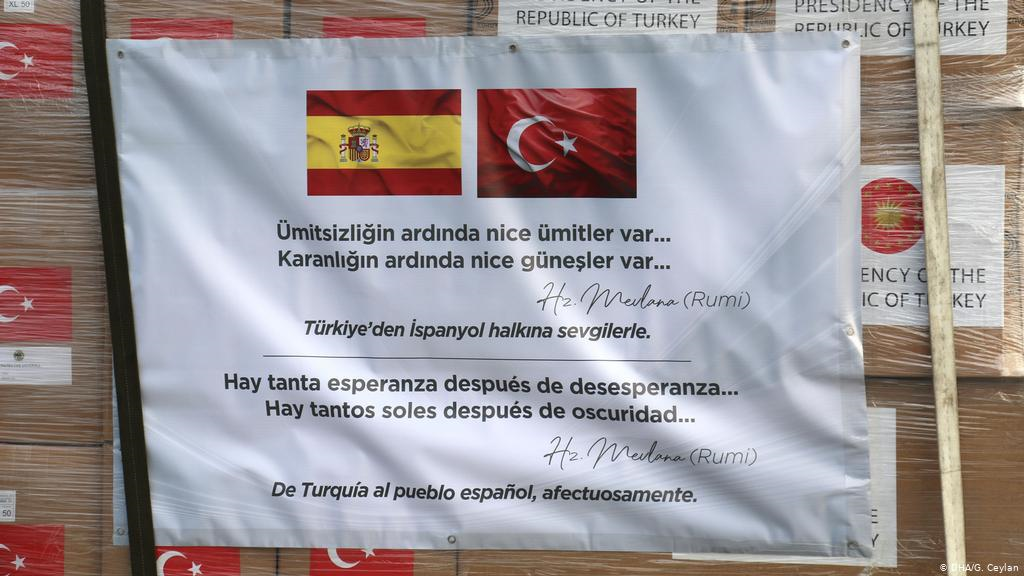
The foreign aid that we have provided in the fight against the pandemic reflects our humanitarian and enterprising foreign policy. Within this framework, we endeavour to meet the assistance requests we receive from all over the world to the extent possible. In this process, our Ministry works in full cooperation with the Ministry of Health and other institutions in receiving, evaluating, directing and providing for the requests from foreign countries.
So far, we have received assistance requests of different categories (material grants, cash assistance, purchase/export permits) from 161 countries.
We have provided aid to 161 countries so far.
We have provided grants to 133 countries, purchase and export permits to 76 countries, and cash assistance to 50 countries among the 161 countries for which we have provided assistance. [A country may receive aid in different categories at the same time (material grants/cash assistance/export permits/purchase permits).]
Among the regions from which we receive aid requests, the African continent leads with 49 countries. Africa is followed by Europe (41 countries), Asia (35 countries), America (21 countries) and Oceania (15 countries).
In addition to these countries, international organizations (20 international organizations/its affiliated organizations) have requested assistance from our country as well. The requests of 12 organizations (OCHA, UNICEF, PAF, SICA, CARICOM, NATO, IGAD, WHO, OSCE, IFRC, UNWRA, African Union-Africa CDC) have been met by our country, in part or in whole.
Our aid mostly consists of medical equipment - particularly personal protective equipment. Also, we grant respiratory devices produced in Türkiye to the countries in need.
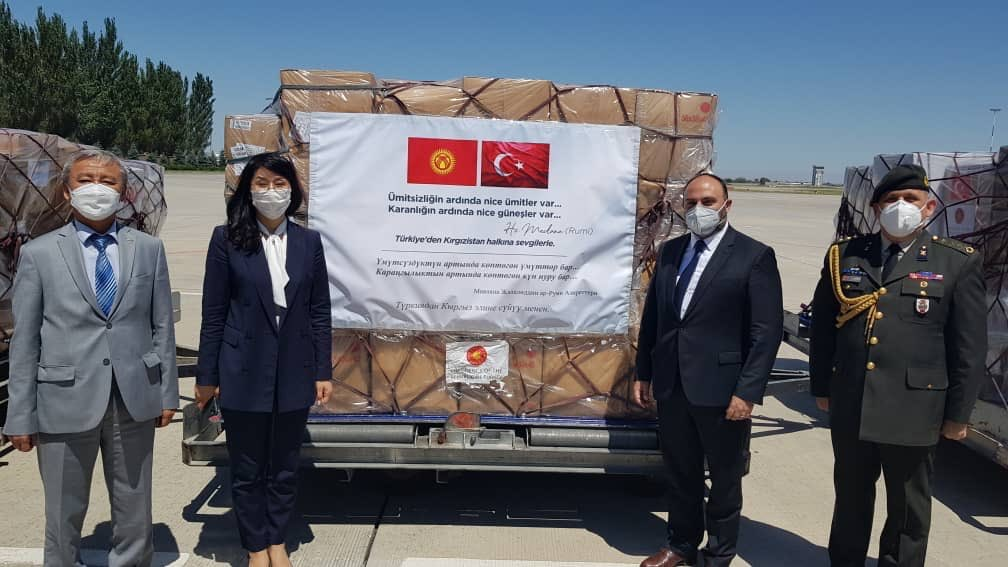
We have also provided food aid to the countries and regions having food security issues under pandemic conditions.
We develop special assistance programmes for disadvantaged groups such as the elderly, the disabled and orphans under pandemic conditions. Various items of assistance have been provided to internally displaced persons, refugees and migrants in Bangladesh, Ethiopia, Kenya, Pakistan, Sudan, Syria, Tunisia and Yemen , street children in Bangladesh, disabled people and orphans in Guinea, children in orphanages in South Sudan, the visually impaired in Kazakhstan, orphans in Kenya, disabled people in TRNC, disabled people and orphans in Romania, Child Welfare dormitories and nursing homes for the elderly and the disabled in Mongolia, fifteen social assistance centres including nursing homes, orphanages, educational facilities for orphaned children and shelters for homeless people in Moldova, nursing homes for orphans and the elderly in Mozambique, disabled children and their families in Namibia, women's shelters and other disadvantaged groups in Yemen.
We carry out educational programmes in some developing countries for production of personal protective equipment, using local resources. Also, we provide raw material to support the production of personal protective equipment by local means. Turkish Cooperation and Coordination Agency (TİKA) has developed training programmes for production of personal protective/hygiene equipment by local means or provided materials for local production in Afghanistan, Bosnia and Herzegovina, Kingdom of Eswatini, Gambia, Georgia, South Sudan, Colombia, Moldova, Mozambique, Serbia, Sudan, Syria and Tajikistan.
We endeavour to provide budget support to some of the friendly countries experiencing economic difficulties because of the pandemic.
The process concerning the medical aid we provide at the international level is carried out through cooperation and coordination between our different institutions. In addition to our Ministry, the main institutions and organizations involved in this process include the Ministry of Health, the Ministry National Defence and Trade, Turkish Red Crescent, Turkish Cooperation and Development Agency (TİKA), Disaster and Emergency Management Presidency (AFAD), Presidency for Turks Abroad and Related Communities and Turkish Airlines.
Our business world also supports friendly nations in their fight against COVID-19. Over 50 Turkish companies have supported more than 20 friendly nations in the fight against the pandemic in various ways.
With its contributions to international solidarity during the pandemic, Türkiye proved once again to the whole world that it is a reliable partner.”
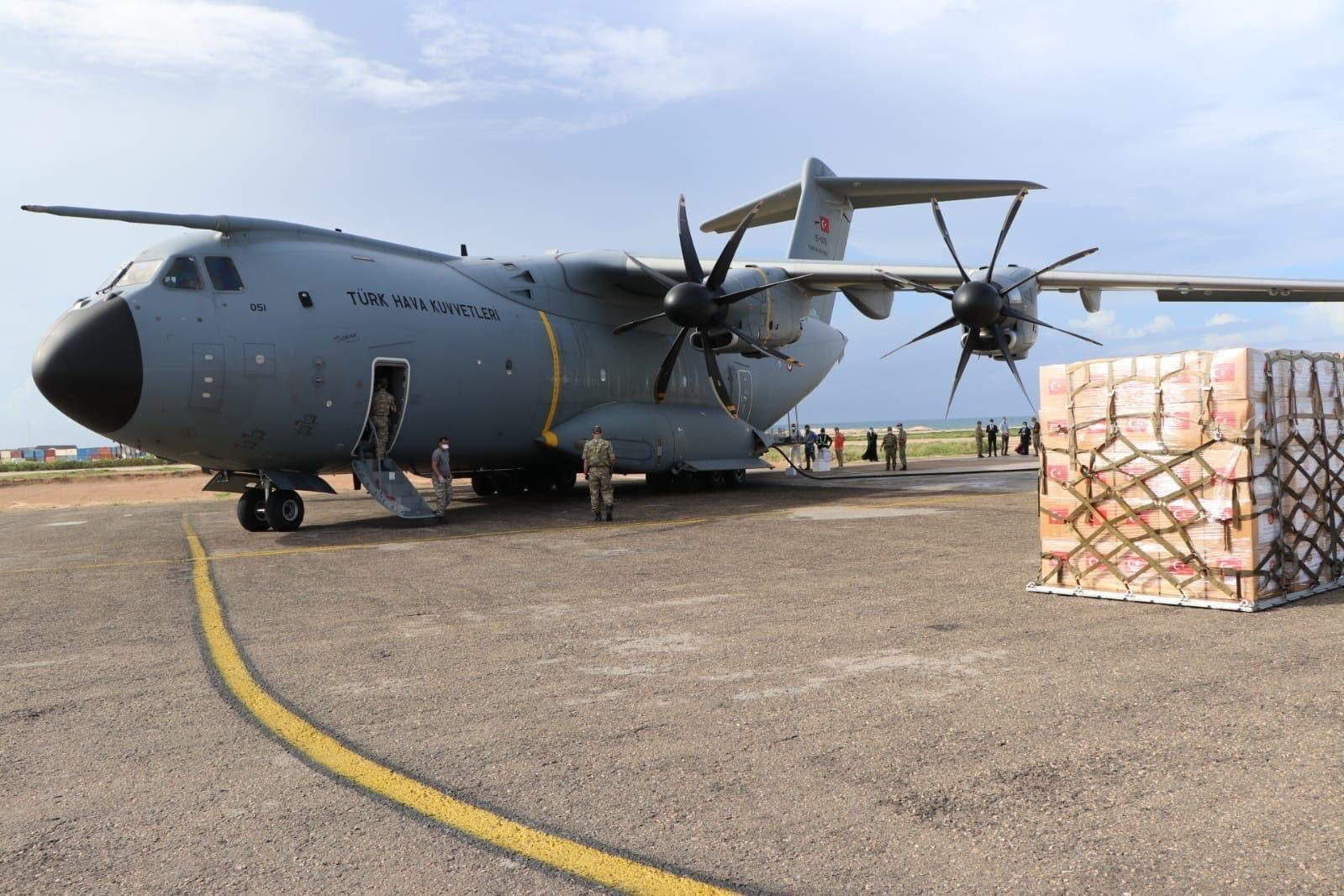
F. Our vaccine grants
As the emphasis shifts to vaccination efforts around the world in the fight against the pandemic, our country is helping to supply vaccines this time to friendly and brotherly countries in need of vaccines.
As of 20 April 2022, more than 6.3 million doses of vaccine have been donated to 19 countries in need. The countries to which we donate vaccines are Bosnia and Herzegovina, Montenegro, TRNC, Kyrgyzstan, North Macedonia, Libya, Moldova, Uzbekistan, Senegal, Tunisia, Turkmenistan and Burkina Faso (within the scope of the grant made on behalf of the Organization of Turkic States), Democratic Republic of Congo, Benin, Niger, Somalia, Tanzania, Mali and Sierra Leone.
On behalf of the Organization of Turkic States, a vaccine grant was made to Burkina Faso and Togo with the contributions of Türkiye, Hungary, Uzbekistan and Azerbaijan. 200 thousand doses donated by our country, 100 thousand doses of Sinovac vaccine donated by Azerbaijan and Uzbekistan were delivered to Burkina Faso, and 211.200 doses of Sinopharm vaccine donated by Hungary were delivered to Togo on December 6.
In addition, at the Third Türkiye -Africa Partnership Summit held in Istanbul on December 18, 2021, President Erdoğan stated that our country would donate 15 million doses of COVID-19 vaccine to African countries. Due work has been initiated in accordance with the instructions of President Erdoğan, and in the first stage, countries that were ready for and in need of vaccines were identified. Subsequently, the shipment of vaccines to countries in need began. As a result of the coordination established between our Ministry, Ministry of National Defence and Ministry of Health, and with the approval and support of our Presidency, a total of 1,730,000 doses (1.6 million Sinovac, 130 thousand TURKOVAC) of vaccines were sent to the Democratic Republic of Congo (DRC) with two different batches (20/21 February 2022); later on, on March 14th, 500 thousand doses of Sinovac vaccine were shipped to Benin and 200 thousand doses to Niger; on the 22nd of March, 1 million doses of Sinovac to Tanzania and 290 thousand 400 doses to Somalia, on April 14th, 500 thousand doses of Sinovac to Mali and 200 thousand doses to Sierra Leone were dispatched
G. Overseas cooperation aspect of vaccine studies
Vaccine development efforts against COVID-19, which are important both strategically and from a humanitarian viewpoint, continue to be at the top of the world’s agenda. Our Ministry closely follows the developments on vaccines, in the world and compiles and conveys the information required by the Ministry of Health, considering especially the potential cooperation and procurement opportunities.
According to the data of the World Health Organization dated 20 April 2022, there is a total of 349 vaccine development studies worldwide. 153 are at the clinical stage, while 196 of them are at the pre-clinical stage. The list includes 19 vaccine candidates from our country, 4 of which are at the clinical stage and 15 are at the pre-clinical stage. Our country has been at the forefront (occupying the 4th place) of vaccine development efforts in the world.
Türkiye has declared in international platforms that it will offer the TURKOVAC vaccine, which it has developed and which has been approved for emergency use at the national level, to the service of all humanity. In this context, our TURKOVAC vaccine has begun to contribute to our health diplomacy activities. The 130 thousand doses of TURKOVAC we sent to the Democratic Republic of Congo was a first in this respect.
H. Our efforts to start international flights
To get international flights started after border restrictions to fight against COVID-19 were lifted on 11 June 2020 with some exceptions, initiatives were taken since the beginning of June by our Representations abroad and with the Foreign Embassies in Ankara, in coordination with our related institutions. As a result of these initiatives, international flights have begun gradually.
Reciprocal flights with 112 countries have been initiated as of 20 April 2022. Works on the flights that are yet to begin are also ongoing. Flights have been arranged by special authorization even when regular flights to some countries had not started yet, and such flights continue to be arranged. The Coordination and Support Centre evaluates permission requests, and conducts the necessary coordination with the Directorate General of Civil Aviation. Flights with humanitarian purposes are allowed in this regard, giving priority to the repatriation of our citizens in the countries where regular flights have not yet started.
I. Our contributions to the works aiming at reviving tourism
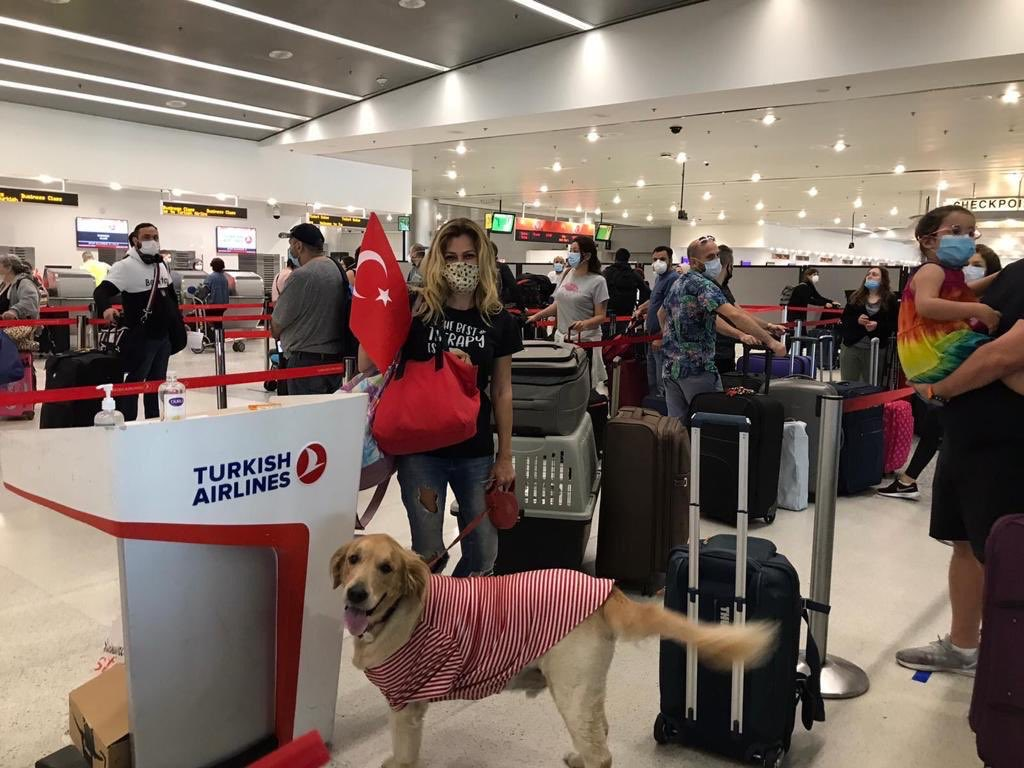
A safe tourism program to revive tourism, which is extremely important for our country’s economy and employment opportunities, has been initiated by the Turkish Ministry of Culture and Tourism in 2020. The said program was further expanded, incorporated and successfully implemented in 2021 as well.
A series of health and hygiene measures have been taken in all areas, including the measures at airports and restaurants, along with those for accommodation and domestic transportation. Relevant certification processes have also been initiated. Among the institutions that issue certificates are German companies TÜV Süd and Royal Cert, British company Lloyd's Register, French company Bureau Veritas and Turkish Standards Institution. Our strong health infrastructure is also ready to ensure the well-being and safety of our guests.
To introduce Türkiye’s comprehensive progress towards safe tourism and to lift travel restrictions and warnings, frequent contacts, initiatives and promotional activities have been carried out, pioneered by the meetings of our President, our Minister and the Minister of Culture and Tourism with their counterparts.
These efforts have yielded good results in terms of the countries that are key tourism markets.
In May 2021, our country was included in the "red list" by the United Kingdom. As a result of our initiatives and extensive information sharing, our country was removed from the red list on September 22, 2021.
Due to the daily increase in cases in our country in the spring of 2021, Russia, which is one of the important source countries for our tourism, significantly limited the number of flights to and from our country. As a result of our initiatives with the Russian authorities, the said restrictions were lifted on 22 June 2021 and the number of flights between the two countries reached the usual level once again.
The quarantine requirement was lifted for unvaccinated Polish citizens and residents traveling to Poland, which is one of the important source countries for tourism in our country, and it was deemed sufficient for the aforementioned people to have a PCR test after their arrival in the country. Subsequently, Poland lifted travel restrictions related to the Covid-19 outbreak in a manner that covers travel from all countries.
Germany, which is one of the countries that carries high importance for our country's tourism, removed our country from the "high risk region" category on 3 March 2022.
Similarly, as part of the travel restrictions imposed by the French authorities within the scope of combating the Covid-19 pandemic, a decision has been taken to include our country in the green category list as of 31 March.
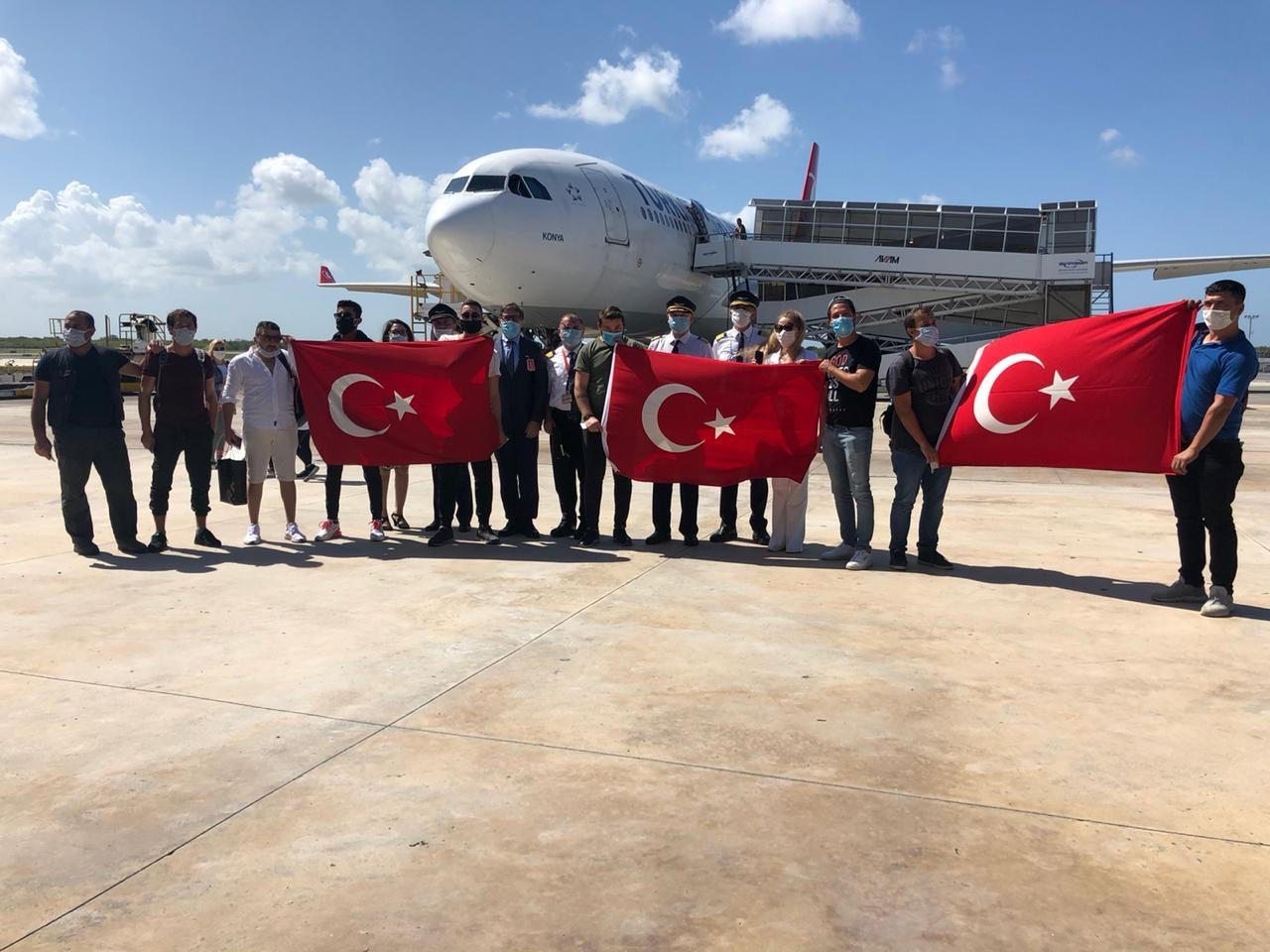
The development and widespread use of vaccines providing effective and safe protection against the virus have presented a certain opportunity to ease the restrictions on flights, travel and tourism. Efforts towards mutual recognition of vaccination certificates have become an important component of our tourism diplomacy in 2021. It has been determined that vaccination certificates will be an innovative and safe instrument in international travels and studies have been carried out in this regard with third countries. As of 20 April 2022, although they differ from each other in terms of content and results shown in practice, recognition of vaccine certificates has been achieved with 24 countries. Currently, studies are continuing with 32 countries for mutual recognition of vaccine certificates.
In addition to our initiatives at the level of individual states, our initiatives at the EU level have yielded positive results. Under the coordination of our Ministry, as a result of the extensive work and cooperation of our Ministry of Health, our country was included in the EU's Digital COVID Certificate system on August 20, 2021.
Restrictions on the travel of our citizens, who are holders of EU-compliant Digital COVID Certificate, to EU countries have been lifted to a large extent. Our vaccinated citizens can take different types of journeys (tourism, etc.) to all EU countries after obtaining their visas. In addition, some EU member states such as Spain, Hungary and the Netherlands accept those inoculated with Sinovac vaccine, although it has not yet been approved by the EU institutions.
Our vaccination certificates have been accepted by the UK, and vaccination certificates have been mutually recognized between the two countries.
In addition, many countries accept our vaccination certificates at the national level unilaterally in border applications.
I. Our contributions to the arrangements regarding the works at our borders, commercial applications and freight shipments, National Coronavirus Coordination Commission, and the participation of our Country to the International Coordination Group Meetings
During the pandemic, it has been understood once again that the smooth operation of the international supply chain is critically important for the social life, to deliver the materials that are vital in the fight against the disease, maintain food supplies and eliminate the economic impacts of the pandemic. Türkiye has made the greatest effort it is capable of, in order not to disrupt the supply chain in international freight shipment during the fight against the pandemic.
Contact-free trade methods have been implemented at our borders with Iraq as of 1 March 2020, with Iran as of 4 March 2020 and with Bulgaria as of 22 March 2020, to meet the society’s needs and ensure the continuity of the supply chain. Trade has been carried out by containers, trailers and driver changes in buffer zones. Contact-free trade de facto ended with Bulgaria on 27 April 2020, with Iran on 6 June 2020, with Iraq on 21 August 2020.
With the Contact-free Trade at Habur Border Gate, the daily average number of exits reached to 642 in March, 1,255 in April, 1,356 in May, 1,395 in June, 1,388 in July, and to 1,210 in August with the de facto ending of the Contact-free Trade on August 21. Thus, the figures got closer to the figures of Habur Border Gate in the pre-crisis period.
Due to the lack of a buffer zone with Iran, it became impossible to carry out any transactions in the highways for a long time. During the period when the borders were closed, all alternatives have been considered, and only Kapıköy Railway Customs Gate stood out as an alternative. In January and February, transportation with an average of 659 wagons was carried out on the railway line, and the total departure reached to 1,797 wagons in April, 1,168 in May, 1,544 in June, 997 in July, and 628 in August.
As a result of the necessary diplomatic initiatives, an annual average of 35,606 transit export trucks going to Central Asian countries were largely diverted to the Baku-Tbilisi-Kars (BTK) railway line.
In the process of the fight against the COVID-19 pandemic, the principles of entry/exit through our border gates are determined by the Circulars of the Ministry of Interior. At the beginning of the pandemic, a 14-day quarantine was imposed with the Circular “International Freight Transport” no. 6360 of 9 April 2020, for Drivers and Vehicles Entering Türkiye to unload goods.
Those procedures and principles were gradually liberalized with the circulars issued on 27 April, 9 May, 14 May, 3 June, 11 June, 15 September 2020 and 17 May 2021 and finalized, taking into account the stage reached in our country in the fight against the pandemic and in neighbouring countries as well.
Coordination in shaping the measures taken by our relevant institutions for our border gates and their transmission to foreign representation offices in our country has been carefully observed during the pandemic process.
On the other hand, within the scope of international freight transport, the necessary initiatives have been made to eliminate the complaints from the sector about various problems -especially the ones regarding visas- faced by our truck drivers due to the practices of other countries at border gates. In this context, an "ad hoc" working group was established between the International Transporters Association and our Ministry, and the first meeting was held on 17 July 2020. The second meeting was hosted by our Ministry on 5 November 2020. On the other hand, an online meeting was held on February 17, 2021 with the participation of the International Transporters Association (UND), EU/Schengen member states and UK Embassies/Consulates and EU Delegation representatives to solve the visa problems experienced by our truck drivers in the Schengen area due to the restrictive measures taken by countries against the COVID-19 crisis.
To address the steps to be taken in the coronavirus pandemic process, Deputy Minister Mr Yavuz Selim Kıran attends the meetings of the National Coronavirus Coordination Commission, established at the level of Deputy Ministers among our relevant institutions, and shares our views and suggestions on the developments regarding pandemic in the world and the response of our country. The twenty-second of the meetings was held via videoconferencing on 22 June 2021.
J. International Cooperation Efforts:
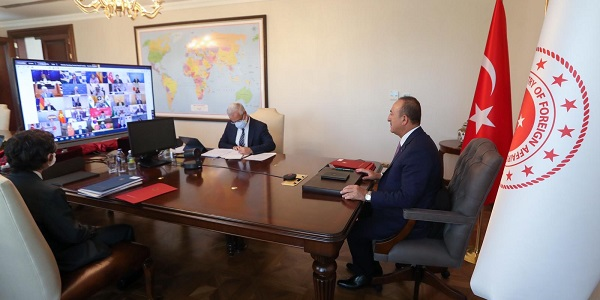
Türkiye has emphasized the importance of international cooperation and solidarity since the beginning of the pandemic, which is a global challenge affecting all of the humanity and has concentrated its efforts and initiatives in this area. In multilateral forums and at the bilateral level, our President has emerged as a leader whose opinions were sought by other countries’ heads of state and government. President Erdoğan has attached great importance to contacts and meetings at the level of other countries’ leaders in the context of multilateral and bilateral cooperation and consultation in the fight against the pandemic.
Minister Mevlüt Çavuşoğlu has also shown result-yielding efforts and contributions to the development of international and bilateral cooperation in the fight against the pandemic, both at multilateral forums and at bilateral meetings. Minister Mevlüt Çavuşoğlu has given priority to the repatriation and medical assistance of our citizens, during the bilateral meetings.
Türkiye has pioneered, fully supported and actively contributed to the cooperation initiatives created and launched to fight against COVID-19. In this framework, contributions have been made to the efforts carried out at the UN, the G20, the Turkic Council, the MIKTA, the Organization of Islamic Cooperation and many international platforms, and importance of multilateralism in the fight against the pandemic has been highlighted.
Türkiye was among the countries that presented the draft resolution on “International cooperation to ensure global access to medicines, vaccines and medical equipment to face COVID-19” at the United Nations General Assembly.
On 26 March 2020, the extraordinary G20 Leaders’ Summit on COVID-19 was held via videoconferencing. Focusing on health, economy, international trade and cooperation, G20 leaders addressed the steps that can be taken under the leadership of G20 to combat the global, social and economic impacts of the virus and adopted a declaration that focuses on financial measures that can be taken in cooperation with the IMF, World Bank and multilateral development banks and the steps that can be taken by coordinating efforts with international organizations such as the UN, the OECD, the ILO and the WHO. Some G20 leaders, notably our President, drew attention to the situation in countries that are particularly vulnerable due to conflicts and the risks faced by refugees and forcibly displaced persons living in unfavourable conditions, and they called for the removal of barriers obstructing free trade and for ensuring the functioning of international trade under the WTO rules.
At the Turkic Council Extraordinary Leaders’ Summit held on 10 April 2020 with the participation of our President, the creation of a joint action plan in the context of the joint fight against COVID-19 was discussed, and views were exchanged on removing the existing obstacles for the timely passage of essential substances, food and medicine across the borders of the Turkic Council member countries, compiling a list of goods that can pass through the borders of the aforementioned countries without obstacles, establishing a mechanism that will enable sharing information rapidly on freight transport at the borders and establishing an online platform where information about infected people can be shared.
At the initiative of our country, the Executive Committee of the Organization of Islamic Cooperation convened via videoconferencing on 22 April 2020 at the level of Foreign Ministers to address the pandemic. At the suggestion of Türkiye, the Final Declaration included the decision on the Committee of Permanent Representatives to convene regularly for coordination and consultation at the intergovernmental level, as the magnitude and severity of the pandemic necessitates frequent, systematic and regular contact and consultation at the intergovernmental level.
At the Informal Meeting of the Council of Ministers of Foreign Affairs of the Black Sea Economic Cooperation Organization (BSEC) held on 25 September 2020, our Minister proposed the establishment among the BSEC countries of a mechanism where good practices can be shared through a coordination network between the centres of crisis and operations, and he drew attention to the contribution such a network would make in conducting activities such as repatriation of citizens and transportation of medical supplies. Secondly, our Minister stated that our proposal was to cooperate in the development and production of vaccines and antiviral drugs and pointed out that some countries, including BSEC members, have taken important steps towards the development of the COVID-19 vaccine and suggested that BSEC adopt a regional and cooperative approach in the field of vaccines. Our Minister has also brought the strengthening and diversification of cooperation between the BSEC Ministers of Health to the agenda.
In the speech he delivered under the agenda item “Responding to Covid-19” at the 19th MIKTA Foreign Ministers Meeting held on 22 September 2021 within the scope of the High-Level Meetings of the 76th Session of the UN, Minister Çavuşoğlu suggested on behalf of MIKTA to provide vaccine aid to the Least Developed Countries (LDCs). Minister Çavuşoğlu underlined that Türkiye calls for fair and low-cost access to Covid-19 vaccines at the 20th Meeting of Ministers of Foreign Affairs of MIKTA held on 7 March 2022, when our country took over the Presidency, and announced the priorities of our Presidency as "global health", "effective migration management" and "food security".
Our Minister attended the Ministerial Coordination Group (MCGC) meetings started at the initiative of Canada with the participation of 16 countries including Türkiye (Brazil, Canada, Australia, France, Germany, Italy, the United Kingdom, Indonesia, South Africa, Morocco, Mexico, Peru, South Korea, Singapore, India and Türkiye) and the EU, and our views and suggestions were shared. Twelve videoconference meetings have been held at the Ministerial Level of the MCGC, which is an informal consultative forum where steps taken to combat the COVID-19 pandemic are discussed at the level of Foreign Ministers. Also, eight meetings were held at the level of senior officials within the MCGC.
On the other hand, Türkiye has actively participated in the studies of the 74th World Health Assembly held on 24 May to 31 May 2021. Within this framework, our country has been the co-host of the Resolution entitled "Strengthening WHO’s Preparedness for and Response to Emergency Situations" and the decision to hold a Special WHA Session in November 2021 to evaluate the preparation of a new Pandemic Framework Agreement.
In this regard, Türkiye has become a member of the Group of Friends of the Treaty, which was established to evaluate the suggestion for the preparation of a new legally binding international document in the field of pandemic preparedness and response.
A Special Session of the World Health Assembly was held on 29 November to 1 December 2021 in a hybrid format with an agenda to discuss the benefits of drafting a new WHO convention, agreement or other legal document in the field of pandemic preparedness and response, and to launch an intergovernmental process for the writing and negotiation of this document. The draft resolution entitled "The World Together: Establishment of an Intergovernmental Negotiating Body to Strengthen Pandemic Prevention, Preparedness and Response", presented by the Group of the Friends of the Pandemic Treaty, of which our country is also a member, was unanimously adopted by the World Health Assembly on 1 December 2021. Türkiye was a co-host for the resolution.
It has been decided with this resolution that, an "Intergovernmental Negotiating Body/INB" be established to draft and negotiate a WHO convention, agreement or other international document in the field of prevention of, preparedness and response to pandemics; the first meeting of the INB be held before 1 March 2022, and at this meeting the working method and schedule of the INB be determined; the essential elements of the international document be set forth via an inclusive process to be determined by the INB and the preparation of the working draft depending on the pace of progress be initialized; the said work be submitted the second meeting of the INB which will be held by 1 August 2022; the INB decide on the provision of the WHO Constitution, on which the document will depend; the INB present a progress report to the 76th Assembly (2023) and present the final output to the 77th Assembly (2024). The INB held its first meeting on 24 February , and the second meeting on 14 and 15 March 2022. During the meetings, the process of determining the main elements of the international document, the INB's work schedule and the targeted outputs within the framework of this schedule and the modalities of engagement with the relevant stakeholders were discussed. The meetings were attended by officials from our Ministry and our Permanent Mission to the UN in Geneva.
The Ministry, under the guidance of its enterprising and humanitarian foreign policy, will continue to put forward its initiatives for the recuperation from this calamity of humanity travelling in the same boat, in cooperation and solidarity, and use the lessons learnt to pave the way for a fairer, share-based and effective structure of the international system in the post-pandemic world.
-->